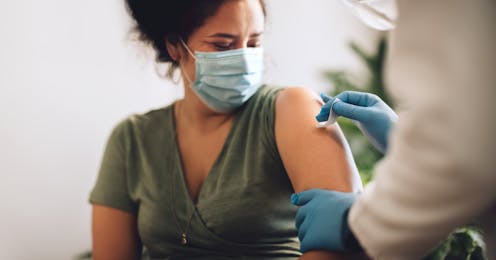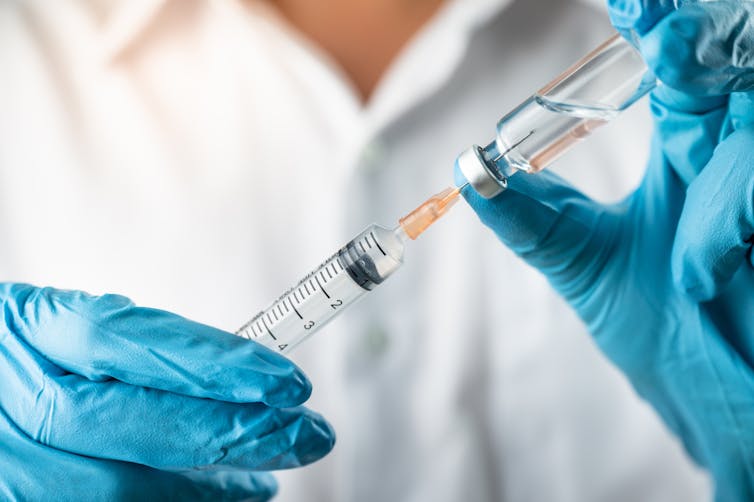
The UK Medicines and Healthcare products Regulatory Agency (MHRA) has approved a new COVID vaccine. VLA2001 is manufactured by French pharmaceutical company Valneva for use in the UK and was approved on April 14 for use in adults between the ages of 18 and 50 for first and second doses.
The Valneva vaccine is the sixth COVID vaccine to be approved in the UK. But it’s the first whole-virus inactivated COVID-19 vaccine to gain MHRA approval. These types of vaccines are based on viruses grown in tissue culture before being chemically inactivated.
An inactivated version of a whole virus (in this case SARS-CoV-2, the virus which causes COVID-19) cannot replicate or cause disease, but teaches the immune system how to fight the real thing. Adjuvants – chemicals which stimulate the immune response – are added to the vaccine to increase its effectiveness.
Inactivated viral vaccines have been used for many years and include vaccines for polio, hepatitis A, influenza and rabies. Valneva already uses this technology to produce a Japanese encephalitis vaccine. Among the current COVID vaccines, the Sinopharm vaccine, which is manufactured in China, is also an inactivated vaccine.
What does the evidence say?
VLA2001 is one of the first vaccines for any infection to receive authorisation based on immuno-bridging data rather than on calculated efficacy from phase 3 trials. Immuno-bridging studies measure immune markers and then infer vaccine efficacy, rather than actually measuring how well the vaccines reduce illness in volunteers. This means these vaccines can be approved more quickly, providing they elicit an immune response as good as other vaccines that have completed full trials.
Relatively little information on the efficacy and safety of VLA2001 is currently available in the peer-reviewed literature. A preprint (a study which has not yet been peer-reviewed) posted in August 2021 reported on a phase 1-2 trial of 153 volunteers aged between 18 and 55. This study suggested that the vaccine was well tolerated and generated good neutralising antibody levels.
A larger trial has been conducted but so far reported only in a company press release and in the MHRA documentation. These results show VLA2001 produced higher antibody levels than the AstraZeneca vaccine after two injections.
Read more: Omicron XE is spreading in the UK – a virologist explains what we know about this hybrid variant
VLA2001 was included in the COV-BOOST study which compared several different vaccines as boosters after initial courses with either Pfizer or AstraZeneca. This study also found that VLA2001 was well tolerated and boosted neutralising antibodies. That said, the increase in neutralising antibodies was not as great as that seen with other vaccines in the study. Further, cellular immunity responses (the response of immune cells called T cells) were not as strong as with the other vaccines.
Notably, all these studies were conducted before the omicron variant became common. In a press release the company reported that three doses of VLA2001 neutralised the omicron variant in laboratory studies. But the issue is not whether a vaccine can neutralise omicron – all can at least for a while. The issue is how strongly the vaccine neutralises this variant and for how long the protection lasts.
We can see from the Office for National Statistics data at a time when omicron was dominant that after just 90 days a third dose of even one of the mRNA vaccines is not particularly protective against infection.
So what can we conclude?
Based on the available data, we can say that VLA2001 is well tolerated with relatively few adverse reactions as a primary course or as a booster dose. So it’s safe.
The vaccine is effective too, but probably not quite as effective as some other available vaccines, especially the mRNA vaccines. As with the other available COVID vaccines there’s likely to be some protection against omicron infection, although this may not last long. Fortunately protection against severe disease from omicron should be more durable.
Read more: COVID-19 vaccines are probably less effective at preventing transmission than symptoms – here's why
Most available COVID vaccines target the spike protein, the part of the virus that binds to the host cell, allowing the virus to infect the cell.
While VLA2001 is based on the ancestral Wuhan coronavirus, the authors of a recent preprint argued that because whole virus vaccines generate immunity to all of the virus and not just against the spike protein, such vaccines may perform better against new escape variants such as omicron.
There is certainly some basis for this suggestion, but we don’t know yet whether it will turn out to be the case.

What next?
With two highly effective mRNA vaccines, Pfizer and Moderna, in use, I doubt that the Valneva vaccine will play much of a role in the UK’s ongoing COVID vaccination campaign.
The UK already has high vaccine coverage, especially in the older age groups (above 60 years). Further mass vaccination campaigns for most people under a certain age in the UK on an annual basis seem unlikely, though boosters for older and medically vulnerable people may be offered for a while.
On the other hand, it is plausible that some people who have resisted COVID vaccination so far may accept a vaccine that is manufactured in a similar way to other vaccines that have been around for decades.
Importantly, this vaccine may also find a role in low income countries because it is easier to transport and store. It can be stored at ordinary refrigerator temperatures unlike the mRNA vaccines which require a more rigorous cold chain.
Paul Hunter consults for the World Health Organization. He receives funding from National Institute for Health Research, the World Health Organization and the European Regional Development Fund.
This article was originally published on The Conversation. Read the original article.







